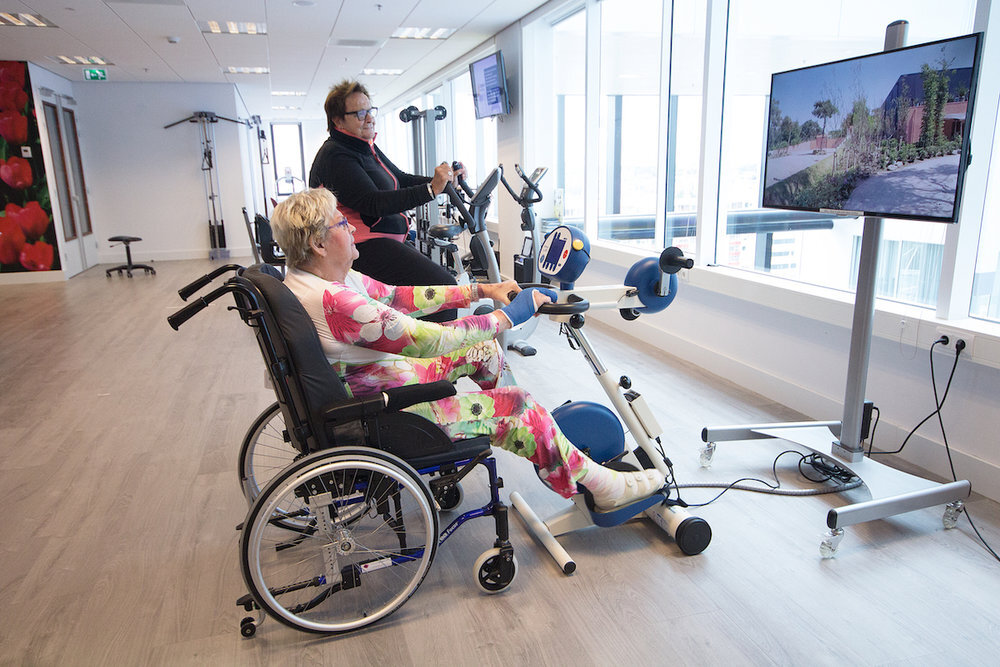Staving off Alzheimers in advancing age
One of the least “spectacular” products we deal with is the Bike Labyrinth system. It is however, one of the products that can have the biggest impact in practice. When cognitive decline due to Alzheimers or dementia is stealing quality of life this approach provides a practical intervention that makes a real difference.
Bike Labyrinth offers interactive, virtual, bike tours intended for people for whom a bike ride outside is no longer an option. Bike Labyrinth is a console that enables people to take interactive bike tours through cities and nature, at home or around the globe - more than 200 routes at the moment and growing. It can even be setup to offer a route through a user’s home town - stimulating memories and thoughts of past experiences.
Let’s explain why this is relevant - why does it make a difference?
Research efforts are gradually progressing in their quest to slow or reverse Alzheimer’s disease and other diseases which appear age-related. But have you noticed that we are always in a situation when “more research is needed”. The fact is that if you are in the midst of personal decline you really don’t want to wait. So what do we do?
We all want to remain vital throughout the second half of our lives. It is not at all comforting to sit awaiting the arrival of brain deterioration - nor is it particularly satisfying even if we can somehow slow down this decline.
Long-term brain health has been shown to be strongly influenced by the choices made by a “well-tuned” and attentive mind. Without the capacity to focus and sustain attention, we are not able to accomplish anything, including maintaining a youthful brain.
A review of the literature on activities that support brain vitality fall into three mutually overlapping categories:
Practices that support the physical body (exercise and movement, nutrition, and sleep)
Maintaining cognitive muscle - the perspectives through which we view our future and sharpen our minds (with curiosity, flexibility, and optimism)
Activities that deepen our social network through accessing our deepest sense of purpose (empathy, social connectedness, and living our lives “authentically”)
Whilst the importance of exercise, nutrition, and sleep to overall health has long been recognised, neuroscience also highlights how these things are central to maintaining a healthy brain into older adulthood. We can’t seperate these things - we “think” as much with our body as much as with our mind. Cognition can be said to be “embodied” - influence the body and you influence the mind and vice versa.
Less well-known is the knowledge that curiosity, flexibility, and optimism are a triad of cognitive perspectives or attitudes with an equally strong impact on long-term brain health. Each attitude builds on and supports the others.
A curious mind isn’t ever satisfied with the status quo. A curious mind seeks novelty and adventure. Going beyond what is known to discover or create something new and different is the hallmark of a curious mind.
Exploring ideas, people, and places in new ways exposes the brain to a continuous stream of the unfamiliar and the unexpected. This results in a brain that is constantly learning, allowing it to tap into its natural neuroplastic potential to rewire, and broadening its ability to respond to life. Without such stimulation neurplasticity “works against us” and traps us in an ever shrinking world.
Alzheimer’s steals our curiosity, flexibility and optimism given the chance.
Bike Labyrinth provides exercise and cognitive stimulation
The ability to respond to the unexpected with flexibility generates stress resilience and reduced anxiety. Curiosity and flexibility encourage the brain to formulate a more optimistic attitude about the unknown.
Optimism is what permits us to persist in our commitments in spite of near-term frustrations and setbacks. An optimistic brain isn’t a self-deluding brain. Instead, when we exercise optimism we actually become more realistic, more grounded, and intimately engaged in the subtleties of daily life. We recognise “what is now ” but remain open that “what is” can be changed in positive and helpful ways in the future.
These core brain-exercise skills are a powerful damper against daily stress, and the more potentially ravaging effects of depression and runaway anxiety.
From the perspective of an ageing but still youthful brain, these well-honed practices muster the perseverance to curiously, flexibly, and optimistically keep exploring the possible even when logic might argue otherwise.
Exercise of mind & body along with social interaction
When you look at the enormous energy, money, and industry that is poured into efforts to preserve youth forever, it is the case that for many of us, the goal is not just to age well — it is to not age at all!
Success in maintaining a youthful brain doesn’t equate to being forever stuck with a 20 year old’s brain (who would want that)
A vital brain doesn’t mean we should turn the clock back in time. Age brings a different perspective and the experience gained over the years can have value.
Our partners from the Netherlands have opened our eyes with their “Bike Labyrinth” product which is proving highly successful in elder care homes and situations where Alzheimers is stealing quality of life.
The product is surprisingly simple in concept but powerful in effect becuase it ticks all three boxes that we revealed above as important. It provides exercise, cognitive stimulation and social stimulation in a very compelling way. The bicycle routes provide recognition, distraction and conversation material.
No one yet has a cure for Alzheimers but tools like Bike Labyrinth can be helpful in slowing the decline.


